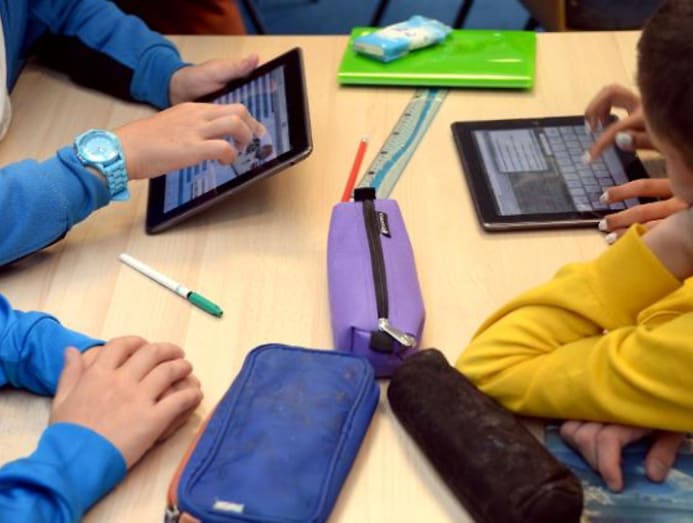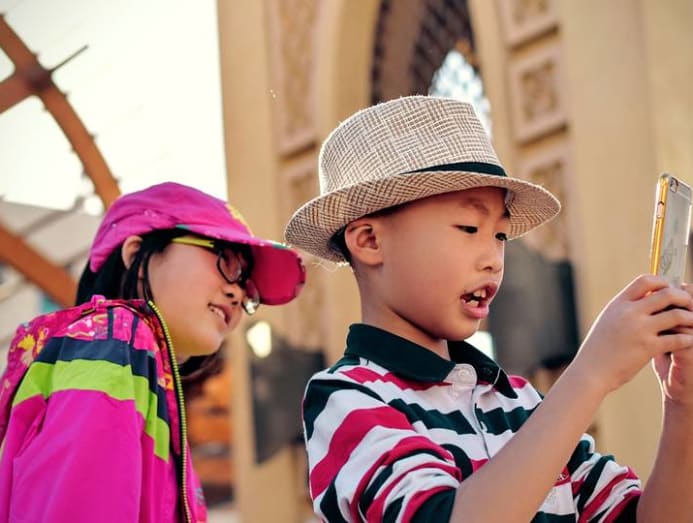Commentary: Tracking your child’s online activity should not be done covertly
SINGAPORE: COVID-19 has seen the acceleration of plans to equip all Secondary School students with a laptop or tablet in Singapore.
This is encouraging news. With the accelerated launch of the programme to equip all secondary school students in Singapore with personal devices, scaffolds are being introduced to brand the digitalised learning surround conducive and edifying for all students.
Merely the recent revelation that these learning devices will be installed with a device management application (DMA) that captures data on students' online activities including web search history was met with consternation by students, fifty-fifty triggering an online petition.
READ: Application installed on students' devices does not rail personal data: MOE
In response, the Ministry of Education sought to reassure everyone that the DMA does not tape personal information such every bit location or passwords simply tracks search history to "restrict admission to objectionable fabric".
CONCERNS Past SOME STUDENTS, WELCOMED By SOME PARENTS
Whereas some students were reportedly aghast at this gross intrusion into their privacy, some parents in fact welcomed such monitoring of their children's internet utilise.
Putting aside these fraught conversations effectually privacy that have already been tackled elsewhere, parental back up for monitoring children's devices is another intriguing issue to delve into.
READ: Commentary: When should children exist allowed to have their own mobile phones?
To be sure, parental enthusiasm for such surveillance in not birthday surprising. Given rising concerns about children'south exposure to pornographic, violent or extremist online content and fears of excessive screen fourth dimension, automated monitoring of children's online activity may in fact appeal to some parents.
After all, well-nigh parents feel duty spring to shield their children from adverse influence both online and offline, to protect them from physical harm and to provide guidance in times of demand.
A contempo survey past Google of parents in the Asia Pacific plant that parents in Singapore reported that the two greatest online threats their children faced in the past year were exposure to inappropriate content and oversharing on social media.
READ: Commentary: YouTube stars make bad role models and information technology's all our fault
TRACKING TACTFULLY
With lifestyles more hectic, families increasingly time-pressed and children online for longer periods, many parents probably feel that a little help from engineering science tin do no damage.
In a world where our activeness logs, sleep patterns and spending habits are religiously recorded by our smart watches, digitally tracking your children's online activeness may seem like a natural and innocuous extension of our technologised lifestyle.
Except that digital surveillance by parents of children must be undertaken with care. In the first example, information technology must not be done covertly.
Parents should not surreptitiously install monitoring software or parental filters merely be upfront with your children. Strive for mutual agreement on what the monitoring and filtering entail and how these will restrict their online activity and device use time.

Reiterate to your children that your goals to keep them prophylactic and guide them to utilise technology sensibly.
READ: Commentary: Singapore needs a new Smart Nation vision that doesn't leave any denizen behind
Younger children are likely to exist more open up to monitoring and restrictions but as they grow older, these measures have to be revisited and progressively relaxed if your children'south history of device use does not give you crusade for concern.
In a higher place all, children must experience assured that the information arising from digital monitoring will non be weaponised to punish them, or this tin pb to ugly confrontations and strain family unit ties.
Second, view such digital monitoring in the broader context of your parent-child bonds. If you and your children already take a relationship of trust, introducing mutually agreed digital controls and filters to help you guide their device use may exist beneficial.
It is natural for parents to be curious about what your children go up to online. Only resist the urge to stealthily monitor your children's online activeness.
This will breach whatever trust lies between you, especially when yous demand to hash out with them whatever you find that is concerning. Your child may become even more secretive and evasive as a effect.
Spying on your child's online activeness may gain you lot some insights, but it cannot build mutual agreement, permit lonely trust. Third, permit your child and not the information practice the talking. Online parental controls, tracking software and screen time records cannot supersede parenting.
Neither should parents be lulled into a faux sense of security from having installed such digital tools.
NO SUBSTITUTE FOR PARENTING
Information about your children'south device apply - sites they visit, games they play, videos they lookout, people they chat with, search terms they employ, amount of time they spend - tin can give y'all a movie of what your children do online, but you still need to personally fill in the blanks on how your children are selecting and processing all this content.
Make time to talk to them, ask them to share with yous interesting online discoveries and to raise confusing or disturbing content with you. Clinch them that you are non there to approximate merely to guide, not to condemn but to confer.
READ: Commentary: COVID-19 has revealed a new disadvantaged group among united states – digital outcasts
With an open and communicative relationship, in that location is a greater likelihood that your child will turn to you in times of demand or distress.
The afore-mentioned Google survey too found that that 65 per cent of Singaporean parents were confident that their children were well-informed about online safety issues and 78 per cent believed their children would approach them if encountering any online safety issues.

Such data is encouraging and perhaps reflects that public education efforts in digital parenting and media literacy accept raised awareness of such bug and best practices.
Notably however, i in five Singaporean parents reported not having washed anything to address their children's online safety concerns.
Precisely because applied science employ will intensify in schoolhouse, at home and beyond, parents demand to foster a relationship of trust with our children so that we are their first port of call when they see online challenges.
Digital surveillance via online parental controls, tracking software and screen time monitors is by no means a magic bullet for agreement your kid's online activity.
Ultimately, raising children in the digital historic period still rests on family ties and parent-child communication - data is no substitute for dialogue.
Listen to a communications researcher and a lawyer break downward WhatsApp's new terms of service on CNA'due south Heart of the Thing podcast:
Lim Sun Sun is Professor of Communication and Applied science and Head of Humanities, Arts and Social Sciences at the Singapore University of Technology and Blueprint. Her most contempo book is Transcendent Parenting - Raising Children in the Digital Historic period (Oxford University Printing, 2020).
Source: https://cnalifestyle.channelnewsasia.com/commentary/commentary-tracking-your-childs-online-activity-should-not-be-done-covertly-295106
0 Response to "Commentary: Tracking your child’s online activity should not be done covertly"
Postar um comentário